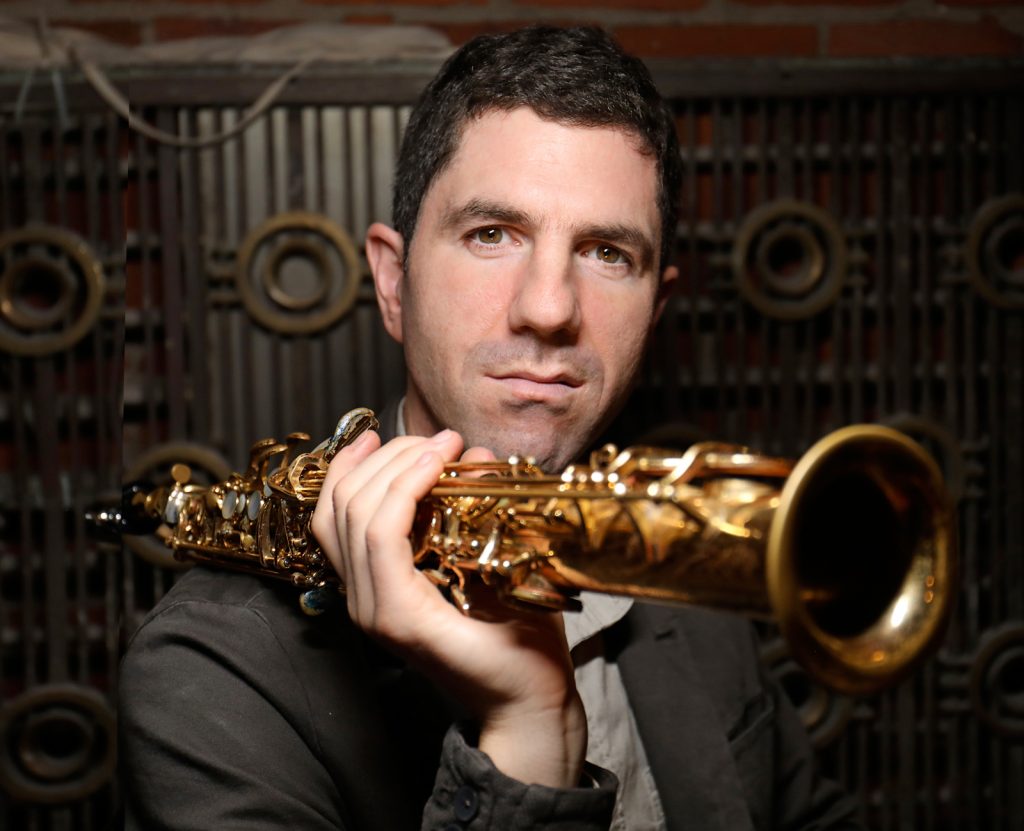Saxophonist and composer Dan Blake’s latest album, Da Fé, opens with an eerie piano solo titled “Prologue—A New Normal.” The track is meant to warn of the world that awaits us if we don’t act against climate change. Blake’s warning is only the tip of his activism: since 2015 he has served on the board of Buddhist Global Relief, which combats hunger and malnutrition, and has produced benefit concerts for them since 2010. More recently, he has organized on behalf of organizations such as Extinction Rebellion, a global environmental movement and the Poor People’s Campaign. Blake, who holds a PhD in music theory and composition and teaches at the New School in New York City, has been a Theravada Buddhist practitioner since college. Now 40, he sees using his platform to bring attention and funds to social justice work as crucial.
Blake spoke with Tricycle about the relationship between music and enlightenment and how jazz has always fueled social change.
How did you decide on the title of your album? I was reading Auto-da-Fé, a novel by the German-language author Elias Canetti. I found out that the title of the English translation refers to a religious ceremony in the Spanish Inquisition when heretics were burned at the stake. At the same time, I was reading Time to Stand Up, by the Buddhist teacher Thanissara, who talks about the need to engage in direct action against climate change. The fires in California were becoming more frequent then, and all this led me to ask: Are we sacrificing ourselves? What are we sacrificing ourselves for? Why would we, as a species, allow this to happen?
The term da fé in Portuguese literally means “of faith,” so more questions came to mind: What do we have faith in? What is the meaning of faith in a society like ours? What can spiritual practices teach us?
How does making music, for you, respond to those questions? A lot of musicians talk about a very deep kind of listening that brings us close to one another. We share a deep bond that can’t be articulated. And then I learned about the bodhisattva of compassion, Guanyin, who realized enlightenment through listening. Her name translates as “perceiver of the sounds of the world.” There’s a direct relationship between sound and compassion and therefore between music and compassion. The question then becomes: How do you bring that into the world? Playing music, even music that I’m really proud of, does not directly feed people who are hungry. It doesn’t stop climate change. It might raise consciousness and make people listen, but the question, for me, is this: What more is there?
Jazz has a long history of being tied to social activism. What is there about the genre that makes that connection so present? In my view, the role of artists in social movements is to support the people who are doing active work on the ground. The most famous case of this in jazz would probably be Billie Holiday’s “Strange Fruit,” released in 1939, which focuses on lynching in the Jim Crow South and raised consciousness of the existing social movement begun by activists like Ida B. Wells. Holiday was persecuted by the FBI and suffered dearly because of her tenacious and courageous performance of that song.
“Playing music might raise consciousness and make people listen. The question, for me, is: What more is there?”
Another element of this comes out of the mid-1960s with the legacy of John and Alice Coltrane—a legacy of potential spiritual awakening through music. John Coltrane’s famous album A Love Supreme is about the idea of there being a love so powerful, so universal, that it could unite all of humanity and connect us to a healing cosmic vibration.
How does creative problem-solving during music improvisation help you with creative problem-solving in other areas of your life, like your activism? Oftentimes in a playing situation there’s a lot of uncertainty, a lot of wondering “what’s happening here, what’s my place in this?” It’s similar to how I think about myself in relation to the larger world and to climate and social movements. I believe that the clearest way artists can engage in activism is by using their platform to speak about what they believe to be moral imperatives. What kinds of creative solutions can we find to address the issues that we care most deeply about?
It’s important to me to focus on the work being done, often by people we never know about or meet. I think about someone like Samuel Nderitu and his wife, Peris Wanjiru. They’re farmers in Kenya who are developing an incredible network of small-scale agricultural families that are learning sustainable agricultural practices to feed their families. They are also taking control of a local food supply chain. This will allow them to avoid the predicament of so many people in Kenya—finding themselves at the hands of multinational agricultural companies like Monsanto.
To me, the single most important thing is to pay attention to the movements being organized right now and to focus on that work and those people as much as possible. Quite simply, they’re my heroes.
Thank you for subscribing to Tricycle! As a nonprofit, we depend on readers like you to keep Buddhist teachings and practices widely available.
